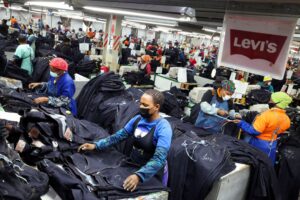Troy Murphy left Notre Dame after his junior year in 2001 and was soon making $1.3 million playing for the Golden State Warriors. He went on to play in the NBA for 12 seasons and make over $66 million in his career. What’s he up to now? He recently started a financial advisory firm to help others deal with sudden wealth — and is donating all profits to high school programs that teach financial literacy.
“Leaving college at 20 and navigating the financial landscape of the NBA? I wasn’t prepared for it. I wanted to create a service that I would have wanted then,” Murphy told MarketWatch. So he started Sweven Wealth, a financial planning firm whose primary focus is to help people manage sudden wealth.
There are many stories about athletes and others who come into sudden wealth and then lose all their money. Sometimes it’s because their money is managed by an unqualified relative or an unscrupulous adviser. People who grow up with parents or mentors who set an example of how to be prudent and smart with money have an advantage, and people who grow up without those examples are at a disadvantage. But a lack of basic financial knowledge is rampant at all income levels. And there’s little help on the way. A recent survey by the Council for Economic Education shows that between 2016 and 2018, no states added personal finance to their K-12 standards or requirements. And only one-third of states require students to graduate having taken a personal finance class.
 Ronald Martinez/Getty Images
Ronald Martinez/Getty Images
All the major professional American sports leagues now have programs to help young athletes handle sudden wealth well — we profiled the NFL’s Personal Finance Camp a few years ago — but many recently-drafted athletes are more excited about their immediate future than about planning for their post-playing days. Having been a college and NBA star, Murphy says he watched many athletes struggle with their finances.
To prepare for his role as a wealth adviser, Murphy went to Columbia University in 2015 to finish his Bachelor’s Degree in Sociology. He then worked for the NBA league office. He said a constant theme when he met with teams was that players were having financial trouble. “Guys were confiding in me. They don’t always get conflict-free advice. I thought I could provide that.” He also passed the Series 65 exam to become certified as an investment adviser. His philosophy: “Passive investment strategy, diversification, tax efficiency, and keeping costs low.”
Sweven’s “Pillars of Success” include: Take personal responsibility for your financial future; understand completely what you’re investing in and why it makes sense for you; keep costs low; and pay it forward. And he stresses that this isn’t all about numbers. “With any sudden wealth event, the biggest initial obstacle is the emotional aspect of adjusting to the money,” he says.
Murphy has an office in Las Vegas and charges $275 an hour, which can be charged in 6-minute increments. That’s it — he doesn’t charge a percentage of invested assets.
The nonprofits
One of the most unique aspects of Sweven is that the company will donate all its profits to handpicked nonprofits dedicated to teaching financial literacy. He said it took him months to find ones he trusted and felt comfortable with, and it was the hardest part about starting the firm.
He settled on two recipients — The Giving Project and the Philly Financial Cooperative. Murphy found them both through Tim Ranzetta, the co-founder of Next Gen Personal Finance.
The Giving Project was created by Kerri Herrild of De Pere High School in Wisconsin. Murphy likes it because it teaches students the value of giving to causes they believe in while applying financial practices such as budgeting and investing. Each student selects a cause they want to donate to and then researches charities that donate to it. Herrild teaches students how to read each charity’s financials. The recipients must be a 501(c)(3) and spend at least 67% of their donations toward their cause. She says that’s based on the tenets of CharityNavigator.org, which evaluates and rates charities based on how they spend their money. Students earn a donation to the charity by creating a promotion that includes the charity’s mission statement, financial data, local connection or benefit, and the student’s own passion for the cause.
“I had no idea about the NBA or where his wealth was coming from,” Herrild said about the first time she spoke with Murphy on the phone. “In the first 10 minutes he was asking detailed questions — he totally impressed me,” she adds. She said it seemed too good to be true. “A person out of the blue wanting to donate? That doesn’t happen to teachers. But then he told me about the NBA and it made sense.”
Her program currently uses money from two local anonymous donors, and each student typically donates $20. What if Murphy ends up giving her thousands of dollars a year, I asked.
“Holy moly! It would be a dream come true. Let’s see where this goes. The kids have been so engaged,” she says.
There are 1,200 students in the school, and last semester about 150 students took the class, which is an elective.
The curriculum was designed by Next Gen Personal Finance. She says one of its goals is for every high school to require personal finance education by 2030. The curriculum is paid for by the endowment, so its free for schools.
“Every high school should teach personal finance. Absolutely without a question. Every student will eventually have to deal with money,” Herrild says.
Murphy’s other recipient is the Philly Financial Cooperative, which was started by Daniel LaSalle at Olney Charter High School in Philadelphia. LaSalle used to teach the class and is now the school’s assistant principal. In this program, students get a real bank account and real jobs, for which they’re paid real money. LaSalle says the students get jobs such as working with students who have learning disabilities, or coaching the debate team, and they have goals, such as to save 10% to 20% of their paychecks. Students can make between $100 and $5,000 a year, depending on their job and how many hours they work. The money comes from local donors. In the first year, the program raised $15,000, and in the third year, even more. Last year, 81 students participated. Students are accepted into the program based on several factors, including their GPA and teacher recommendations.
Last year, half of the money the students earned was still in their savings accounts at the end of the year, LaSalle says proudly.
“We’re a low-income school. Some kids don’t get allowances. Some are on food stamps and 100% get free lunches. With this program, kids can leave school with a few thousand dollars. That’s a lot, considering many of the parents are unbanked,” LaSalle says.
He hopes that working with Murphy will help more kids learn and save.
“It’s so cool to meet people like Troy, who are really interested in making the world a better place,” he says.





